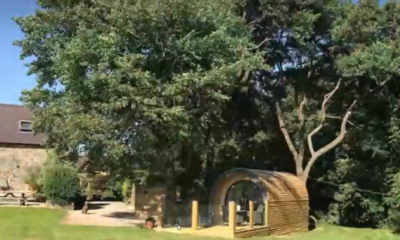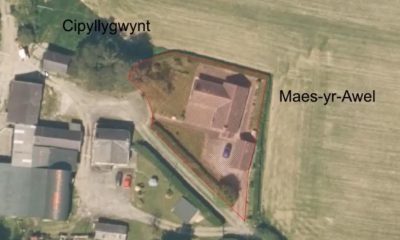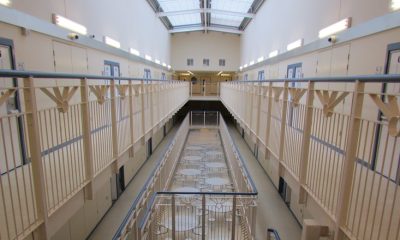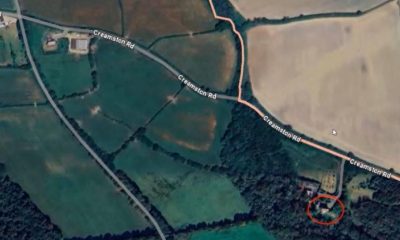News
Competing with Netflix: Welsh language TV to be protected with more digital content

NEW measures will enshrine importance of regional and minority language in UK broadcasting law, The UK Government has said. A package of support for Welsh broadcaster S4C to produce digital content has been announced.
The plan is to expand S4C’s digital and online services and to remove current geographical broadcasting restrictions amid a shake-up on broadcasting rules. On Thursday, the Secretary of State for Digital, Culture, Media and Sport, Nadine Dorries, revealed as part of a white paper, such changes would help the Welsh language broadcaster broaden its reach and offer content on a wide range of platforms.
This comes after the UK Government announced that S4C had secured an improved funding deal in January, which will include an additional £7.5m each year through the BBC license fee to support its digital offering. According to the UK Government, changes to broadcasting rules “will enable S4C to continue to support the Welsh economy, culture and society, reach more Welsh language speakers including younger audiences, and the UK government’s commitment to support the ambition of 1 million Welsh speakers by 2050.”

Decades-old broadcasting regulations will be updated to give the UK’s vital public service system a deal fit for the streaming age and make sure the importance of programmes broadcast in the UK’s regional and minority languages is recognised in the public service broadcaster (PSB) remit for the first time.
The broadcasting white paper published this week also includes plans for regional and minority language content published on digital platforms to be captured in S4C, STV and other broadcasters’ public service remit.
Geographical broadcasting restrictions will be removed from the Welsh language broadcaster S4C so people can enjoy Welsh content no matter where they are in the UK – supporting the Welsh economy, culture and society, and the UK government’s ambition to see one million Welsh speakers by 2050.
Moves to boost the prominence of programming by channels such as BBC, S4C and STV will support Welsh and Gaelic language broadcasting in Wales and Scotland by ensuring they are available and easy to find on smart TVs, streaming sticks and set-top boxes. These are part of plans to give PSBs greater flexibility in how they meet their obligations and strengthen their ability to target younger audiences amid a rapidly changing media landscape.
UK Media Minister Julia Lopez said: “Broadcasting in regional and minority languages provides a crucial opportunity for speakers to enjoy a range of quality shows in a language familiar to them, and a means of cultural expression for communities across the UK.
“We will – for the first time – make the importance of programmes broadcast in the UK’s regional and minority languages clear in law by including it in our new public service remit for television.”
Following the publication of the paper, Nadine Dorries took to social media to explain the changes further. She tweeted: “Noswaith dda… Newyddion da i S4C… The Broadcasting white paper published today expands your remit, secures your prominence and recognises your unique and critical role in British culture. Pob lwc!”
Secretary of State for Wales Simon Hart said: “Hundreds of thousands of people access Welsh-language content every week and our plans will provide greater support to broadcasters like S4C and make it easier for audiences to find content in the language of their choice.
“Welsh-language broadcasting and production plays a crucial part in the creative industries and the UK Government will continue to support the sector as we work towards our ambition to see one million Welsh speakers by 2050.
“Today’s announcement follows our commitment of £7.5m a year for S4C’s digital development, ensuring the widest possible range of platforms”
The Welsh Conservatives have also welcomed the news. The Shadow Minister for Culture, Tourism and Sport, Tom Giffard MS, said the changes “will help broadcasters – including S4C – compete with some of the big streaming giants like Netflix and Amazon Prime”.
The government will continue to support long-term commitments to support cross-border broadcasting on the island of Ireland including funding for the Northern Ireland digital terrestrial television multiplex that has carried RTÉ and TG4 services to Northern Ireland since 2012. It will also consider the scope to ensure the prominence of regional and minority language services.
The government’s Broadcasting White Paper sets out a huge range of measures to protect British content by giving public service broadcasters a more flexible remit for the programmes they produce and show.
This includes plans to better give viewers of video-on-demand services the same protections from harmful content as TV viewers by establishing a new Ofcom code and regulatory powers on content standards.
The government will pursue a change of ownership of Channel 4 to give it the tools it needs to succeed in the future as a public service broadcaster while protecting its distinctiveness.
Crime
Swansea man dies weeks after release from troubled HMP Parc: Investigation launched
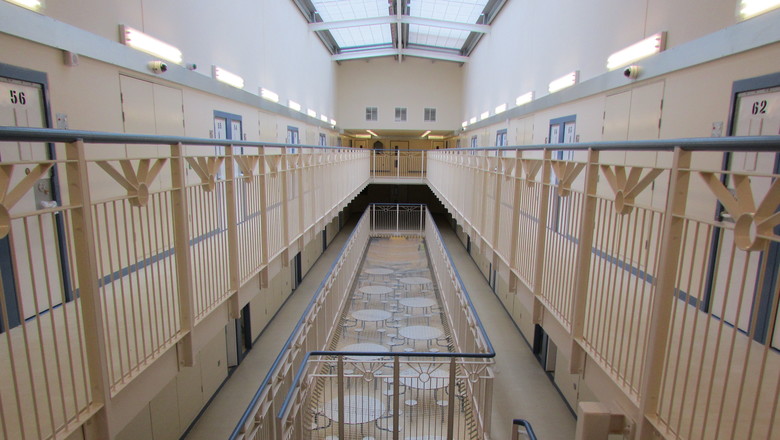
A SWANSEA man has died just weeks after being released from HMP Parc, the Bridgend prison now at the centre of a national crisis over inmate deaths and post-release failures.
Darren Thomas, aged 52, died on 13 November 2025 — less than a month after leaving custody. The Prisons and Probation Ombudsman (PPO) has confirmed an independent investigation into his death, which is currently listed as “in progress”.
Born on 9 April 1973, Mr Thomas had been under post-release supervision following a period at HMP/YOI Parc, the G4S-run prison that recorded seventeen deaths in custody in 2024 — the highest in the UK.
His last known legal appearance was at Swansea Crown Court in October 2024, where he stood trial accused of making a threatening phone call and two counts of criminal damage. During the hearing, reported by The Pembrokeshire Herald at the time, the court heard he made threats during a heated call on 5 October 2023.
Mr Thomas denied the allegations but was found guilty on all counts. He was sentenced to a custodial term, which led to his imprisonment at HMP Parc.
Parc: A prison in breakdown
HMP Parc has faced sustained criticism throughout 2024 and 2025. A damning unannounced inspection in January found:
- Severe self-harm incidents up 190%
- Violence against staff up 109%
- Synthetic drugs “easily accessible” across wings
- Overcrowding at 108% capacity
In the first three months of 2024 alone, ten men died at Parc — part of a wider cluster of twenty PPO-investigated deaths since 2022. Six occurred within three weeks, all linked to synthetic drug use.
Leaked staff messages in 2025 exposed a culture of indifference, including one officer writing: “Let’s push him to go tomorrow so we can drop him.”
Six G4S employees have been arrested since 2023 in connection with alleged assaults and misconduct.
The danger after release
Deaths shortly after release from custody are a growing national concern. Ministry of Justice data shows 620 people died while under community supervision in 2024–2025, with 62 deaths occurring within 14 days of release.
Short sentences — common at Parc — leave little time for effective rehabilitation or release planning. Homelessness, loss of drug tolerance and untreated mental-health conditions create a high-risk environment for those newly released.
The PPO investigates all such deaths to determine whether prisons or probation failed in their duties. Reports often take 6–12 months and can lead to recommendations.
A system at breaking point
The crisis at Parc reflects wider failures across UK prisons and probation. A July 2025 House of Lords report described the service as “not fit for purpose”. More than 500 people die in custody annually, with campaigners warning that private prisons such as Parc prioritise cost-cutting over care.
The PPO investigation into the death of Darren Thomas continues.
Crime
Woman stabbed partner in Haverfordwest before handing herself in

A WOMAN who stabbed her partner during a drug-fuelled episode walked straight into Haverfordwest Police Station and told officers what she had done, Swansea Crown Court has heard.
Amy Woolston, 22, of Dartmouth Street in Milford Haven, arrived at the station at around 8:00pm on June 13 and said: “I stabbed my ex-partner earlier… he’s alright and he let me walk off,” prosecutor Tom Scapens told the court.
The pair had taken acid together earlier in the day, and Woolston claimed she believed she could feel “stab marks in her back” before the incident.
Police find victim with four wounds
Officers went to the victim’s home to check on him. He was not there at first, but returned shortly afterwards. He appeared sober and told police: “Just a couple of things,” before pointing to injuries on his back.
He had three stab or puncture wounds to his back and another to his bicep.
The victim said that when he arrived home from the shop, Woolston was acting “a bit shifty”. After asking if she was alright, she grabbed something from the windowsill — described as either a knife or a shard of glass — and stabbed him.
He told officers he had “had worse from her before”, did not support a prosecution, and refused to go to hospital.
Defendant has long history of violence
Woolston pleaded guilty to unlawful wounding. The court heard she had amassed 20 previous convictions from 10 court appearances, including assaults, battery, and offences against emergency workers.
Defending, Dyfed Thomas said Woolston had longstanding mental health problems and had been off medication prescribed for paranoid schizophrenia at the time.
“She’s had a difficult upbringing,” he added, saying she was remorseful and now compliant with treatment.
Woolston was jailed for 12 months, but the court heard she has already served the equivalent time on remand and will be released imminently on a 12-month licence.
News
BBC apologises to Herald’s editor for inaccurate story

THE BBC has issued a formal apology and amended a six-year-old article written by BBC Wales Business Correspondent Huw Thomas after its Executive Complaints Unit ruled that the original headline and wording gave an “incorrect impression” that Herald editor Tom Sinclair was personally liable for tens of thousands of pounds in debt.

The 2019 report, originally headlined “Herald newspaper editor Tom Sinclair has £70,000 debts”, has now been changed.
The ECU found: “The wording of the article and its headline could have led readers to form the incorrect impression that the debt was Mr Sinclair’s personal responsibility… In that respect the article failed to meet the BBC’s standards of due accuracy.”
Mr Sinclair said: “I’m grateful to the ECU for the apology and for correcting the personal-liability impression that caused real harm for six years. However, the article still links the debts to ‘the group which publishes The Herald’ when in fact they related to printing companies that were dissolved two years before the Herald was founded in 2013. I have asked the BBC to add that final clarification so the record is completely accurate.”
A formal apology and correction of this kind from the BBC is extremely rare, especially for a story more than six years old.
-

 Crime2 days ago
Crime2 days agoDefendant denies using Sudocrem-covered finger to assault two-month-old baby
-

 Crime2 days ago
Crime2 days agoPembroke rape investigation dropped – one suspect now facing deportation
-

 News2 days ago
News2 days agoBaby C trial: Mother breaks down in tears in the witness box
-

 Crime7 days ago
Crime7 days agoMan denies causing baby’s injuries as police interviews read to jury
-

 Crime2 days ago
Crime2 days agoLifeboat crew member forced to stand down after being assaulted at Milford pub
-

 Crime3 days ago
Crime3 days agoDefendant denies causing injuries to two-month-old baby
-

 Crime3 days ago
Crime3 days agoPembrokeshire haven master admits endangering life after speedboat collision
-

 Crime20 hours ago
Crime20 hours agoMother admits “terrible idea” to let new partner change her baby’s nappies alone




